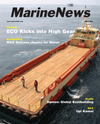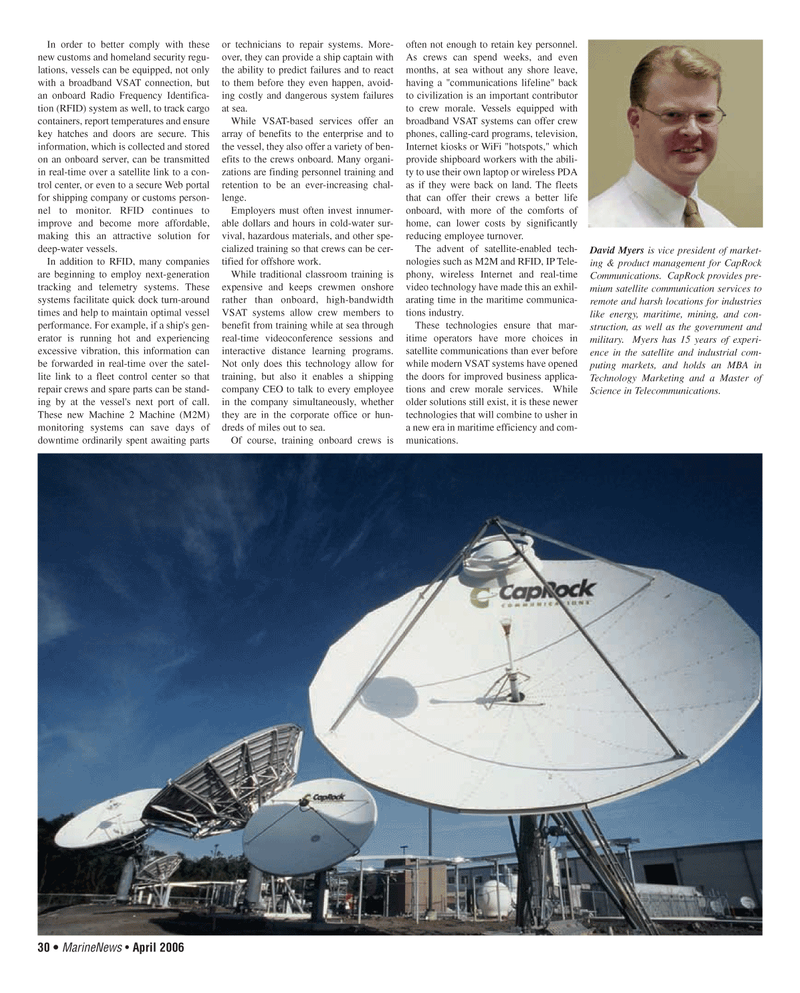
Page 30: of Marine News Magazine (April 2006)
Offshore Support
Read this page in Pdf, Flash or Html5 edition of April 2006 Marine News Magazine
In order to better comply with these new customs and homeland security regu- lations, vessels can be equipped, not only with a broadband VSAT connection, but an onboard Radio Frequency Identifica- tion (RFID) system as well, to track cargo containers, report temperatures and ensure key hatches and doors are secure. This information, which is collected and stored on an onboard server, can be transmitted in real-time over a satellite link to a con- trol center, or even to a secure Web portal for shipping company or customs person- nel to monitor. RFID continues to improve and become more affordable, making this an attractive solution for deep-water vessels.
In addition to RFID, many companies are beginning to employ next-generation tracking and telemetry systems. These systems facilitate quick dock turn-around times and help to maintain optimal vessel performance. For example, if a ship's gen- erator is running hot and experiencing excessive vibration, this information can be forwarded in real-time over the satel- lite link to a fleet control center so that repair crews and spare parts can be stand- ing by at the vessel's next port of call.
These new Machine 2 Machine (M2M) monitoring systems can save days of downtime ordinarily spent awaiting parts or technicians to repair systems. More- over, they can provide a ship captain with the ability to predict failures and to react to them before they even happen, avoid- ing costly and dangerous system failures at sea.
While VSAT-based services offer an array of benefits to the enterprise and to the vessel, they also offer a variety of ben- efits to the crews onboard. Many organi- zations are finding personnel training and retention to be an ever-increasing chal- lenge.
Employers must often invest innumer- able dollars and hours in cold-water sur- vival, hazardous materials, and other spe- cialized training so that crews can be cer- tified for offshore work.
While traditional classroom training is expensive and keeps crewmen onshore rather than onboard, high-bandwidth
VSAT systems allow crew members to benefit from training while at sea through real-time videoconference sessions and interactive distance learning programs.
Not only does this technology allow for training, but also it enables a shipping company CEO to talk to every employee in the company simultaneously, whether they are in the corporate office or hun- dreds of miles out to sea.
Of course, training onboard crews is often not enough to retain key personnel.
As crews can spend weeks, and even months, at sea without any shore leave, having a "communications lifeline" back to civilization is an important contributor to crew morale. Vessels equipped with broadband VSAT systems can offer crew phones, calling-card programs, television,
Internet kiosks or WiFi "hotspots," which provide shipboard workers with the abili- ty to use their own laptop or wireless PDA as if they were back on land. The fleets that can offer their crews a better life onboard, with more of the comforts of home, can lower costs by significantly reducing employee turnover.
The advent of satellite-enabled tech- nologies such as M2M and RFID, IP Tele- phony, wireless Internet and real-time video technology have made this an exhil- arating time in the maritime communica- tions industry.
These technologies ensure that mar- itime operators have more choices in satellite communications than ever before while modern VSAT systems have opened the doors for improved business applica- tions and crew morale services. While older solutions still exist, it is these newer technologies that will combine to usher in a new era in maritime efficiency and com- munications.
David Myers is vice president of market- ing & product management for CapRock
Communications. CapRock provides pre- mium satellite communication services to remote and harsh locations for industries like energy, maritime, mining, and con- struction, as well as the government and military. Myers has 15 years of experi- ence in the satellite and industrial com- puting markets, and holds an MBA in
Technology Marketing and a Master of
Science in Telecommunications. 30 • MarineNews • April 2006
APRIL MN2006 4(25-32).qxd 4/7/2006 3:12 PM Page 30

 29
29

 31
31
